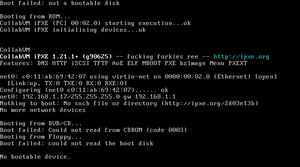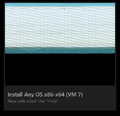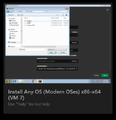VM7: Difference between revisions
Undefishin (talk | contribs) No edit summary |
Undefishin (talk | contribs) No edit summary |
||
| Line 18: | Line 18: | ||
* Windows 2000 to 11 |
* Windows 2000 to 11 |
||
* Any GNU/Linux distribution with VirtIO modules built in |
* Any GNU/Linux distribution with VirtIO modules built in |
||
* Any Windows bootleg from [https://computernewb.com/~lily/ISOs/crustywindows/ Crustywindows] |
* Any Windows 2000 to 11 bootleg from [https://computernewb.com/~lily/ISOs/crustywindows/ Crustywindows] |
||
* OpenBSD |
* OpenBSD |
||
* OmniTribblix |
* OmniTribblix |
||
| Line 28: | Line 28: | ||
* Due to the high requirements of Windows 11, attempting to insert the ISO will insert "Windows 7 Haunted Edition" instead. |
* Due to the high requirements of Windows 11, attempting to insert the ISO will insert "Windows 7 Haunted Edition" instead. |
||
* [[AnyOSInstallBot]] may not be present sometimes due to an admin kicking it (Possibly due to abuse of the bot) |
* [[AnyOSInstallBot]] may not be present sometimes due to it being offline or an admin kicking it (Possibly due to abuse of the bot) |
||
* [[Forkies]] usually come on VM7 to eject the CD through [[AnyOSInstallBot]] or type !reboot in the middle of an install or when you are using the system. (They mostly change the CD in the middle of an install) |
* [[Forkies]] usually come on VM7 to eject the CD through [[AnyOSInstallBot]] or type !reboot in the middle of an install or when you are using the system. (They mostly change the CD in the middle of an install) |
||
* Some retard has tried to do the Log4j vulnerability through chat. Clearly a server written in C++ would be vulnerable to Log4Shell! (there is log4cxx but it's (almost) a completely different thing, but still, collab-vm-server doesn't utilize any other Apache products other than its license & Guacamole) |
|||
* Another retard thought [[AnyOSInstallBot]] was a shell script, and tried to execute a script to delete the user directory but failed horribly. |
* Another retard thought [[AnyOSInstallBot]] was a shell script, and tried to execute a script to delete the user directory but failed horribly. |
||
| Line 41: | Line 39: | ||
== Tips for both VM7 and VM8== |
== Tips for both VM7 and VM8== |
||
* You are better off using this VM when no one is there (Join at like 1:00 AM EST), because I guarantee you one faggot is gonna come, insert his Pissta or Server 2008 (or maybe CHOCOLMOS) CD and install that over whatever you are installing. |
* You are better off using this VM when no one is there (Join at like 1:00 AM EST), because I guarantee you one faggot is gonna come, insert his Pissta or Server 2008 (or maybe CHOCOLMOS) CD and install that over whatever you are installing. |
||
* People enjoy installing operating systems that are already their own VMs. Instead of doing that, try installing |
* People enjoy installing operating systems that are already their own VMs. Instead of doing that, try installing some really obscure OS or a bootleg from Crustywindows. |
||
| ⚫ | |||
* Now that cool-down is also based on number of user list, you can use Vote for Reset instead of !reboot, !bootset & etc to avoid waiting for another command. |
|||
| ⚫ | |||
* If you don't want to wait so long for <code>!reboot</code>, you can alternatively open the webapp OSK and soft reboot the virtual machine by pressing Ctrl+Alt+Delete. |
|||
* When booting, go to iPXE command line and type in <code>exit</code>, this way you don't have to wait for iPXE to tell you that there is no network devices then let you boot to CD or floppy. |
* When booting, go to iPXE command line and type in <code>exit</code>, this way you don't have to wait for iPXE to tell you that there is no network devices then let you boot to CD or floppy. |
||
* The best bootset order is <code>nad</code>. Why? |
* The best bootset order is <code>nad</code>. Why? Not because that's a word for testicles, but because by using the sanboot command in iPXE, you can still boot to the hard drive by typing in <code>sanboot -d 0x80</code>. |
||
== Gallery == |
== Gallery == |
||
<gallery> |
<gallery> |
||
5259Glitch.PNG|People installing a post-reset Vista build (and failing, as you can see) |
5259Glitch.PNG | People installing a post-reset Vista build (and failing, as you can see) |
||
WinCHOC.PNG|Windows [[CHOCOLATEMAN]] Edition running on VM7 |
WinCHOC.PNG | Windows [[CHOCOLATEMAN]] Edition running on VM7 |
||
VM8Default.PNG|VM8 when restored from the snapshot. Notice how it does not have "CollabVM iPXE" |
VM8Default.PNG | VM8 when restored from the snapshot. Notice how it does not have "CollabVM iPXE" |
||
VM8XP.PNG|People installing Windows XP Professional on VM8 |
VM8XP.PNG | People installing Windows XP Professional on VM8 |
||
</gallery> |
</gallery> |
||
Revision as of 15:56, 31 May 2022
VM7 is a VM that debuted in December 2021. The VM allows any user to install any OS they want, either through Lily or Dartz's ISO folder or from a website using !httpcd (url). A list of them can be found at http://computernewb.com/~dartz/isos and http://computernewb.com/~lily/ISOs.
There is also an alternate version of VM7 for older operating systems you can use, called VM8. You can view the article for it here.
Users interact with the VM through a bot named AnyOSInstallBot. Another way users can interact with the VM is the default iPXE which is named "CollabVM iPXE", a custom version of iPXE. This iPXE version behaves similar to vanilla iPXE, VM8 does not have this however.

Facts about VM7
- Due to the high requirements of Windows 11, attempting to insert the ISO will insert "Windows 7 Haunted Edition" instead.
- AnyOSInstallBot may not be present sometimes due to it being offline or an admin kicking it (Possibly due to abuse of the bot)
- Forkies usually come on VM7 to eject the CD through AnyOSInstallBot or type !reboot in the middle of an install or when you are using the system. (They mostly change the CD in the middle of an install)
- Another retard thought AnyOSInstallBot was a shell script, and tried to execute a script to delete the user directory but failed horribly.
- An extremely common occurrence on VM8: People tend to try and install 64-bit OSes on Install Any OS (OLD OSES), which is 32-bit. It always seems like they read "older OSes" and think "It's just a clone of VM7" and try to insert his Pissta or Server 2008 CD into it.
- Most people that come on here don't know how to use part of the
boot.netboot.xyzmenu. They choose Windows, load the installer from nothing (boot with no base URL) (Keep in mind, that choosing Windows expects you to load WIMs from a remote source), leave the base URL blank when they are PROMPTED to put something there, load it again, leave the base url blank, try changing the architecture, and repeat.
Tips for both VM7 and VM8
- You are better off using this VM when no one is there (Join at like 1:00 AM EST), because I guarantee you one faggot is gonna come, insert his Pissta or Server 2008 (or maybe CHOCOLMOS) CD and install that over whatever you are installing.
- People enjoy installing operating systems that are already their own VMs. Instead of doing that, try installing some really obscure OS or a bootleg from Crustywindows.
- If you want to install Windows 7 on VM7, Consider doing !lilycd WinCHOC.iso, it's literally a CHOCOLATEMAN themed version of Windows. Make sure to select Ultimate during setup.
- If you don't want to wait so long for
!reboot, you can alternatively open the webapp OSK and soft reboot the virtual machine by pressing Ctrl+Alt+Delete.
- When booting, go to iPXE command line and type in
exit, this way you don't have to wait for iPXE to tell you that there is no network devices then let you boot to CD or floppy.
- The best bootset order is
nad. Why? Not because that's a word for testicles, but because by using the sanboot command in iPXE, you can still boot to the hard drive by typing insanboot -d 0x80.
Gallery
-
People installing a post-reset Vista build (and failing, as you can see)
-
Windows CHOCOLATEMAN Edition running on VM7
-
VM8 when restored from the snapshot. Notice how it does not have "CollabVM iPXE"
-
People installing Windows XP Professional on VM8



